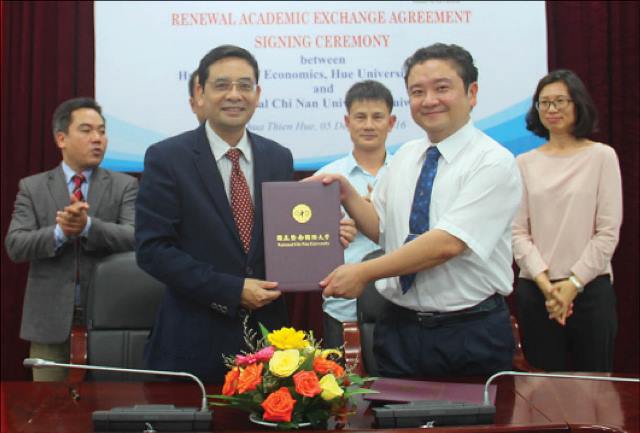
Prof. Dr. Tran Van Hoa - Rector of College of Economics, Hue University and Prof. Yang Wu-Hsun - Chi Nan University signed a cooperation agreement. Photo: College of Economics, Hue University
Dang Thi Thanh Thuong, class K48, majoring in Economics and Environmental Resource Management (academic year 2014-2018), College of Economics, Hue University is an alumna who participated in many international cooperation programs through internship program, student exchange program in the US, the Philippines and Thailand.
“The opportunity to participate in international programs has helped me to be much more confident in communication. The international exchange and cooperation programs have brought about useful knowledge on economics, politics, cultural issues as well as current issues, and helped me gain more experiences, and gave me chances to try taking part in global activities,"- Thuong said.
International cooperation is a matter of concern to improve the quality of training at the College of Economics, Hue University, and currently, the school has established cooperation with more than 40 universities, research institutes and international organizations.
The school has been implementing training cooperation programs such as Training program at the same level as university degree in Finance and Banking in association with University of Rennes 1, France, from 2007 to present; Advanced program for bachelor's degree in Agricultural economics - Finance in association with University of Sydney, Australia, from 2010 to present; The joint program of international bachelor training in Business administration in association with Tallaght Institute of Technology, Ireland, from 2016 to present. Many of the university's faculty members are members of international networks.
International cooperation also opens up many opportunities for students to access the education market, labor market (such as Thailand, Korea, Taiwan, Bulgaria ...) through short-term exchange programs. Thereby, the school could build an international cultural and educational environment.
Many students of the school participated in master and doctoral programs or participated in foreign labor market. Through the survey, the rate of students having jobs right in the first year after graduation is from 81 to 90%.
Assoc. Prof. Dr. Truong Tan Quan, Vice Rector of the College of Economics, Hue University, who had the opportunity to study a master degree in Agricultural economics in Australia and continue his doctorate in New Zealand, said: "The common goal of the school is to improve the quality of training, integrating with the domestic and international labor market. International cooperation is considered as a means, a tool and orientation of the school to foster and train high-quality lecturers”.
Up to now, about 50% of the university's lecturers are trained for master and doctorate degrees and/or receive certificates in short-term training courses abroad. Through international cooperation, the school can "import" or improve, adjust more appropriate training programs; at the same time, it can carry out many projects, scientific researches, and have opportunities for professional academic and researching exchanges with foreign professors.
Assoc. Prof. Dr. Truong Tan Quan shared that at the previous stage, when there were many opportunities to access international cooperation, the capacity of university lecturers was limited. Currently, when the lecturers have more sufficient capacity, the funding sources have decreased.
Therefore, the school has changed from passive ways to active ones of seeking partners. The school officials are not only trained but also able to establish relationships with foreign partners. It is these personal relationships that have developed into a formal relationship between the school and international education units.
Phuoc Ly
